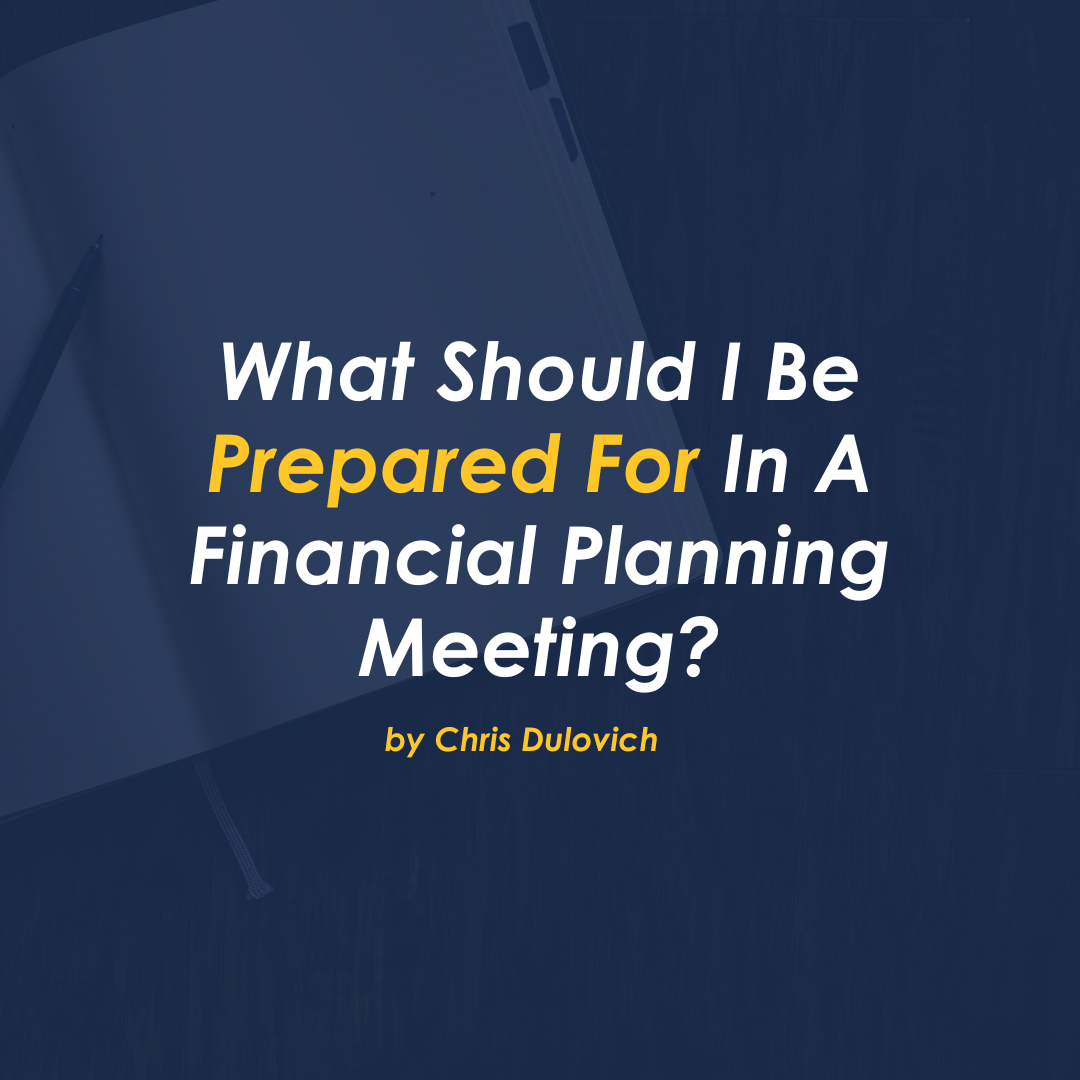When I am speaking to a client about their initial meeting to begin their financial planning they are unsure if they are prepared to come in and meet. They are unsure of what to bring with them or if they are prepared for what will happen during the meeting. This is a concern that is shared by many clients as they want to be sure the meeting is productive and that neither party is wasting their time. The initial meeting is tough because you might not be sure of how the planner will approach things. How they will ask questions, or even what questions they will ask.
To help with the anxiety of the initial meeting with your financial planner lets go over some things to ‘Be Prepared’ for:
- Be Prepared to bring information with you
- When you go in to meet with a financial planner you want to be sure that they have the information they need to get an overview of your financial picture.
- Bringing in statements of your current accounts can give them a good basis of where you currently stand and what needs to be addressed in the planning process.
- It is not realistic to bring everything needed for the first meeting, but I often advise that bringing what you feel are the most important items can be a huge help because we know what is top of mind and what we need to address.
- Often, if you ask the financial planner, they might have a checklist or some resource to help you see what documents are good to bring with you.
- When you go in to meet with a financial planner you want to be sure that they have the information they need to get an overview of your financial picture.
- Be Prepared to talk about your financial picture in great depth.
- This might seem like an obvious thing to be prepared to do in a financial planning meeting, but clients can sometimes be caught off guard by being asked to dive deep into their financial picture.
- While discussing what kinds of accounts you have, where they are held, and how much is in the accounts is good information there is much more to discuss when it comes to your overall financial needs.
- Being prepared to explain:
i. how you contribute to them
ii. how you have approached your asset allocation to this point,
iii. or how you have felt about your risk are ways a financial planner can gain more knowledge to help guide you in the future. - There is much more to discuss when it comes to your financial picture than can be seen on a statement, and the more you are willing to offer the more the planning can help you.
- This might seem like an obvious thing to be prepared to do in a financial planning meeting, but clients can sometimes be caught off guard by being asked to dive deep into their financial picture.
- Be Prepared to possibly be uncomfortable during the conversation.
- When meeting with your planner for the first time you likely hope that the meeting is smooth and there is no time when anyone feels out of their comfort zone.
- This is often not the reality when it comes to meeting and discussing your financial life.
- You might have to answer questions and discuss topics that you and your spouse have avoided to this point. You might be asked to address items that you have never taken time to think about in the past and are unsure of how to answer.
- This is the time to bring issues and concerns to the forefront so that you know what needs to be addressed in the planning process.
- Talking about things such as your expenses or what plans are in place should one of you pass away unexpectedly can be uncomfortable, but that moment of being uncomfortable might be important in making sure you are addressing the bigger picture.
- Just know it is likely you are not the first client that has been in an uncomfortable position in front of that financial planner, and they would not be asking you these questions if they were not important.
- When meeting with your planner for the first time you likely hope that the meeting is smooth and there is no time when anyone feels out of their comfort zone.
- Be Prepared to talk, a lot!
- You might have a view that meeting with a financial planner will consist of them throwing financial jargon at you and just talking the whole time. This can, unfortunately, be the reality sometimes, but an initial meeting should be quite the opposite.
- I have seen time and time again that a client comes in for a meeting with me and they tell me that they want to know if they are on track. They give me their statements to look at, then sit back and wait for me to go into my presentation.
- They seem surprised when I explain to them that I want to know more and start asking questions. They tell me at the end of the meeting that they weren’t aware they would be talking so much, and I just explain to them that I need to know more about them to properly advise them and develop their plan, and it is what they are saying that helps me learn about their needs.
- Being prepared to be open and free with more information is very helpful in getting more information that will help in educating you in your planning. The more your planner knows the more they can help.
- You might have a view that meeting with a financial planner will consist of them throwing financial jargon at you and just talking the whole time. This can, unfortunately, be the reality sometimes, but an initial meeting should be quite the opposite.
- Be Prepared for homework.
- We all can relate to the pain of having homework during our school days, but this homework is different. This homework is vital to getting the most accurate picture possible for your plan.
- By being prepared for the fact that you will likely have some homework after the initial meeting with a financial planner it will help to reduce your stress when they tell you what else is needed to develop your plan.
- You might need to gather additional financial statements, your annual expenses, your insurance documents, and your debt structure. It might not seem like a lot, but this homework can sometimes cause you to delay meetings or even cancel because you were just not prepared for the fact that it was a possibility.
- We all can relate to the pain of having homework during our school days, but this homework is different. This homework is vital to getting the most accurate picture possible for your plan.
It is my hope that showing you some items to be prepared for in a financial planning meeting can help you to reduce the amount of stress in possibly setting that appointment with a financial planner to begin the process. The goal of the initial meeting, or as we call it at Beratung Advisors our Listen Meeting, is to get to know you and how the planning can help empower you to make informed financial decisions. I hope that you are more prepared for the first step after reading this blog.
Content in this material is for general information only and not intended to provide specific advice or recommendations for any individual.The opinions expressed in this material do not necessarily reflect the views of LPL Financial.
The examples are hypothetical and are not representative of any specific investment. Your results may vary.











